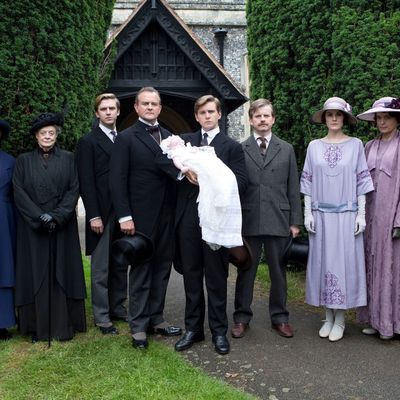
Be warned: The following post discusses a major plot point in last night’s season finale of Downton Abbey. In case there were any doubt as to whether or not Matthew was dead from a random car accident at the end of Downton Abbey’s season-three finale on Sunday, producers took care to include lingering shots of his lifeless eyes and bleeding skull. Rigor mortis is setting in! Dan Stevens will not be back! it all seemed to say. When the episode premiered in the U.K. back in December, series boss Julian Fellowes attempted to explain to stunned viewers why the character, a new dad and the drama’s romantic lead, had to be written off in such harsh fashion. It wouldn’t have been believable for Mary and Matthew to separate (again) and for Matthew to never see his child, Fellowes said, and since Stevens did not want to return even on a recurring basis, killing him off became the only option.
Fine, he had to die. The show couldn’t rightly have Dan Stevens’s absence next season explained as “he’s just working a lot,” with the character making sporadic, fleeting appearances through old footage and look-alikes, as with Crispin Glover in Back to the Future Part II. But did he have to perish in such a sudden, harsh fashion? This seemed a very arbitrary, dismissive way to do it; he wasn’t trying to stop a robbery, or swerving to avoid a kid playing in the middle of the road — he was just the victim of the kind of random crash that teenagers might be shown in twenties driver’s-ed kinescopes to scare them. Take that, triumphant character arc! Try learning how to walk again after this one!
Fellowes further excused himself from the way poor Matthew had to go by saying he was “rather amused by the idea that these plot decisions are taken by producers and writers rather than the actors. In truth, they are taken entirely by the actors.” That could be read as a Godfather-like veiled threat: “You want off my show? Here’s what happens.” Maybe he had the camera linger on Stevens’s graying body in the road for the same reasons that King Joffrey displayed Ned Stark’s head on a stake in Game of Thrones. When Jessica Findlay-Brown also decided to leave the show once movie offers began pouring in, her character Sybil died of complications from childbirth, making for a far more martyrlike exit. Is this because Sybil was less vital to the show’s main arcs, having relocated from Downton? Conspiracy theories abound! Of course, Fellowes insists there is no bad blood between him and Stevens, and he told the Times that when the show resumes, six months will have passed — and with them, the mourning over Matthew. When it comes to Dan Stevens, the Kübler-Ross stages of grief should be worked through over a long weekend and then let’s move on!
Unlike The Walking Dead, where the life-and-death stakes make the fates of its characters precarious from the outset, or even Grey’s Anatomy, a soap opera where disaster strikes at least every other season, Downton’s deaths so far have been twisty (Mr. Pemuk dying during sex, the suicide of Mrs. Bates) or super melodramatic (Lavinia uses her final breaths to tell Matthew he should be with Mary). Sybil’s demise was engineered for ultimate dramatic impact. But Matthew’s seems more in line with what showrunners can do when they’re feeling vengeful or bitter about an actor wanting out. Remember when David Caruso decided his talent was too big for NYPD Blue? Creator Steven Bochco made it so Caruso’s Detective John Kelly quit the force in disgrace, only to be referenced later, and briefly, as having become a professional bodyguard.
There are more extreme cases, too: When Isaac Hayes quit South Park after publicly objecting to the show’s lampooning of Scientology, Matt Stone and Trey Parker killed off Chef by having a mountain lion and a bear rip him apart (and then showing his corpse defecate). Charlie Sheen’s alter ego on Two and a Half Men fell into an oncoming train in Paris. (Chuck Lorre, via Melanie Lynskey’s character Rose, described his end thusly: “His body just exploded like a balloon full of meat.”) And, depending on whom you believe in a court of law, Desperate Housewives creator Marc Cherry took out his frustrations with Nicollette Sheridan, who sued Cherry for assault a year later, by getting rid of Edie in painful, prolonged fashion: In her final episode, she was strangled, rammed into a pole, and electrocuted.
Clearly, we don’t actually know whether Fellowes had revenge on his mind. But if they want to play it safe, it can’t hurt for remaining Downton actors itching to spread their wings to assume that Fellowes was giving a not-so-subtle warning. You want to leave, Hugh Bonneville? Well then, Lord Grantham will probably gamble the family’s money away (again) … and find Cora’s knife in his back! Or maybe he’ll get the ultimate pointless, shaming death, having an Elvis-like heart attack on the Downton commode. Nobody is safe … except for Maggie Smith. Fellowes has already said the Dowager Countess will live on no matter what the actress decides about remaining in the ensemble. Should the day ever come when Smith wants out, he said, “Violet is going to live by the sea in case Maggie changes her mind.”

